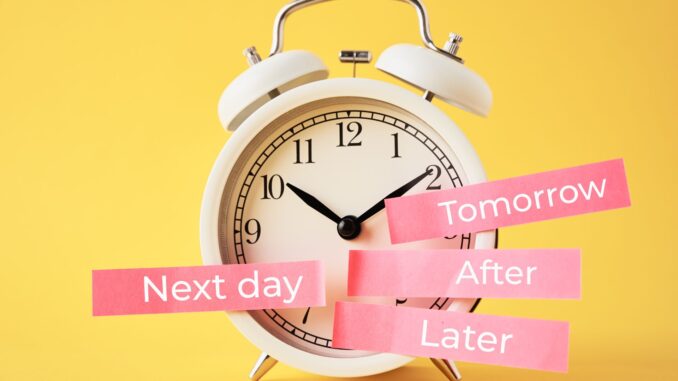
We all put things off occasionally, but procrastination can be a big productivity killer, at work or at home. Does everybody procrastinate, or is it just an ADHD thing?
Procrastination is the act of delaying or postponing a task or set of tasks. Although in the short-term procrastination can lead to improved mood if it helps you avoid unpleasant tasks, in the long-term it can lead to stress, burnout and depression.
Procrastination in ADHD
Around 20% of the general population are thought the be procrastinators and this generally increases with time in people who procrastinate. This is partly because adults with ADHD often have less ‘internal motivation’ and rely instead on ‘external motivation’, such as deadlines, to engage with tasks.

It is thought that levels of procrastination in adults with ADHD are much higher though, and there are two main reasons for this.
Firstly, ADHD is associated with a lack of ‘executive functions‘, the higher level thinking skills including organisation, prioritisation and self-regulation. Lacking these skills can mean that it is more difficult to start a project as it can lead to poor time management, planning or problem-solving.
The second reason adults with ADHD tend to procrastinate is their emotions. ADHD is also commonly associated with emotional dysregulation and rejection sensitivity (RSD). These emotional issues mean that a fear of failure or criticism can lead to a project being ‘put off’ for alternative, more attractive alternatives.
RSD can amplify procrastination, as adults with ADHD may find themselves stalled by the need for self-imposed perfectionism. If they can’t achieve perfection, they can’t avoid a possible rejection, so they don’t do anything at all. Research has also suggested that our mood influences whether we procrastinate or not.
Researchers at Carleton University in Canada and Sheffield in the UK have proposed that procrastination is in fact an issue with managing our emotions and not our time. Often, the task we’re putting off is making us feel bad because it seems boring, or difficult or we’re worried about failing. To make ourselves feel better, we start doing something else, like watching videos or scrolling on our phones.

So what can be done?
Three key aspects of procrastination have been proposed; the pace at which we work, the ‘intention-action gap’, and the availability of distractions. All three are key aspects of task engagement for adults with ADHD. But we can approach these aspects of procrastination by trying the following tips:
• Setting expectations – when assigned a task always ask for its priority and deadline.
• Organise your time – use your most productive part of the day for tasks and not emails.
• Break down tasks and goals into smaller, more manageable steps.
• Set realistic deadlines for yourself – under promise and overachieve.
• Eliminate distractions from your work environment – phones, notifications, and even windows can draw us away from unrewarding tasks.
• Mind mapping – having a ‘brain dump’ to get all the information you need for a task in one place.
• Adding external accountability and/or gamification – body doubling or trying to find a way to gamify a task can help make it more rewarding.
It’s also important to emotionally, except that as an adult with ADHD, you do not choose to procrastinate, and sometimes if your brain finds a task on rewarding, it will be difficult to engage with it.
Author: James Brown, PhD.

Leave a Reply
You must be logged in to post a comment.